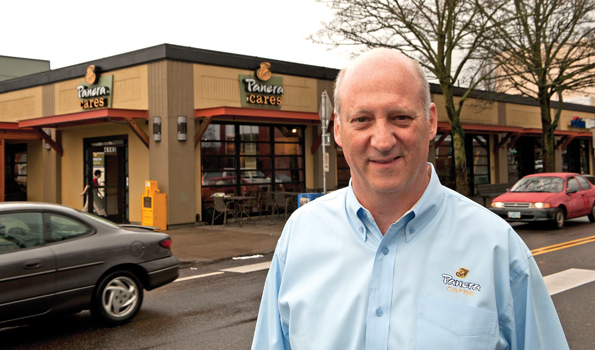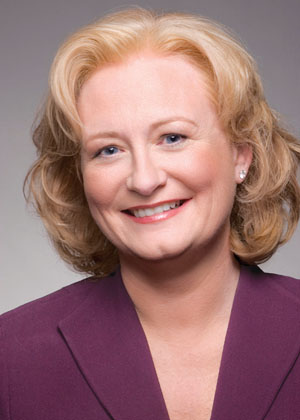Nation’s Restaurant News ranked only the top 10 most powerful people in foodservice out of the 50 influential people who make up The Power List. The remaining 40 people on the list have been divided into groups highlighting the type of influence they have on the industry. Here, we feature The Catalysts: people who are promoting change in the restaurant industry.
Cheryl Bachelder, chief executive, AFC Enterprises Inc.

More and more diners “love that chicken from Popeyes,” due in large part to the turnaround efforts of Cheryl Bachelder, who became chief executive of parent company AFC Enterprises Inc. in 2007.
Shortly afterward, she implemented the company’s Roadmap to Success, based on four pillars: differentiate the brand from competitors, operate superior restaurants, improve profits and speed the growth of Popeyes Louisiana Kitchen with high-quality restaurants.
The initiative has paid off. During the third quarter of 2010, Popeyes beat KFC in a U.S. taste test between Popeyes’ spicy and mild bone-in fried chicken and KFC’s Original Recipe bone-in fried chicken. Bachelder can be especially proud of that, considering she was president and chief concept officer at KFC from 2001 to 2003.
Systemwide revenue for the 2,000-plus-unit Popeyes is nearly $2 billion; same-store sales are strong. To increase sales, Bachelder is leading Popeyes’ programs to remodel its domestic units — the goal is to have 80 percent completed by the end of 2014 — and speed drive-thru service so transaction time is less than three minutes.
On top of all that, Bachelder is passionate about developing future leaders through a number of avenues. She is involved with the National Restaurant Association Educational Foundation’s ProStart program and the Women’s Foodservice Forum, and she posts regularly on her Purpose of Leadership blog, where she provides mentoring to future industry leaders. In 2012 she added a fifth pillar, “servant leadership,” to the Roadmap to Success.
For those who want to understand one key to her success: “Great leaders acknowledge others’ contributions before their own,” she wrote on her blog.
— Gregg Cebrzynski
Laurie Burns
(Continued from page 1)
Laurie Burns; senior vice president, Darden Restaurants Inc.; chair, Women’s Foodservice Forum

You’re not likely to find “introvert” on anyone’s list of top traits of great leaders. But Laurie Burns — senior vice president for Specialty Restaurant Group strategic platform and development at Darden Restaurants Inc., chair of the Women’s Foodservice Forum and a self-proclaimed introvert — says it’s possible to be a great leader no matter what your personality.
“My name is Laurie Burns, and I’m an introvert,” she told attendees at a WFF conference last April. “Your peers, your team, want to know who you are and what makes you tick. ... For me, it’s not how much you say. It’s what you say that matters to your employees.”
Burns may be a woman of few words, but she’s effectively used them to earn success and growing influence in the restaurant industry. She started out as a private real estate development consultant and joined Darden as vice president of development for Red Lobster in April 1999. Just one year later, after achieving all new opening and remodel goals, Burns was promoted to senior vice president of development. In her current position, she leads all development initiatives across Darden’s Specialty Restaurant Group, which includes Bahama Breeze, Seasons 52, The Capital Grille, Eddie V’s Prime Seafood and Yard House.
Burns’ influence continues to grow well beyond Darden. In September, in light of the passing of WFF president and chief executive Fritzi Woods, Burns was named to lead the strategic direction and guide overall operations for the organization.
— Fern Glazer
Stephen J. Caldeira
(Continued from page 2)
Stephen J. Caldeira, president and chief executive, International Franchise Association

It’s nice to have friends in high places, and the foodservice industry has one in Stephen J. Caldeira, president and chief executive of the International Franchise Association.
Among the positions he’s held in the past, Caldeira has been an executive at PepsiCo Inc., public affairs specialist at Burson-Marsteller, head of global communications and chief public affairs officer for Dunkin’ Brands Inc., chief operating officer of the National Restaurant Association Educational Foundation, a renowned fundraiser for notable causes, and a political operative.
Caldeira is especially attuned to the economic concerns of the restaurant industry, and is familiar with the inner workings of Washington politics.
Restaurant industry members comprise 42 percent of the IFA’s ranks, and Caldeira has been blunt in assessing what the federal government ought to legislate for restaurant franchisees and franchisors. He advocates comprehensive immigration reform that includes mandatory use of the E-Verify system and a new W-Visa program, allowing employers to hire foreign workers for lower-skill jobs after Americans have an opportunity to fill them.
Caldeira opposes a mandatory increase in the federal minimum wage, arguing that it would add an incremental cost that would prevent franchisees from investing in their businesses. He also is a champion of tax reform, which he says would grow the economy and enable franchisees to create jobs.
And he has pressed for those jobs to include returning veterans of the Iraq and Afghanistan wars. Under his leadership, the IFA has partnered with the White House and franchisors — including restaurants — to recruit veterans as franchise owners.
— Gregg Cebrzynski
Gerry Fernandez
(Continued from page 3)
Gerry Fernandez, founder and president, Multicultural Foodservice & Hospitality Alliance

For more than 15 years, Gerry Fernandez has been an outspoken advocate for diversity and inclusion in the foodservice industry.
The head of the Multicultural Foodservice & Hospitality Alliance, Fernandez has tirelessly urged foodservice leaders to diversify their workforces, vendor networks and customer bases to unlock their businesses’ full potential. In that time, the MFHA has emerged as the industry’s premier voice and solutions provider for multicultural business challenges and counts some of the world’s largest restaurant companies and food manufacturers among its roster of corporate members.
After graduating from Johnson & Wales University with a degree in foodservice management and culinary arts, Fernandez spent nearly 15 years working in the foodservice industry at Rare Hospitality Inc. and later General Mills Inc. He founded the MFHA in 1996 after realizing there was no existing group designed to create career opportunities for minorities and people of color.
A key tenet of Fernandez’s message is that companies with the ability to attract and nurture multicultural talent and speak to diverse audiences — what the MFHA calls Cultural Intelligence — will see better business results. The organization offers its members access to an extensive series of live events, educational initiatives, and consulting and coaching services designed to build those skills and create measurable results.
“To attract and retain top multicultural talent, we need to use quantifiable facts that illustrate our commitment and progress on diversity and inclusion issues,” Fernandez said last fall. “Equally important is the need to be open and honest about opportunities to improve.”
— Ed Rubinstein
Ron Shaich
(Continued from page 4)
Ron Shaich, co-founder and chief executive, Panera Bread Co.

People thought Ron Shaich was nuts when he opened Panera Cares; he said so himself in an interview last year.
But Shaich, co-founder and chief executive of Panera Bread Co., has long been acknowledged as a pioneer in the foodservice industry and one of its best CEOs. By opening Panera Cares, where customers pay what they can afford, he did what came naturally to him. Having created the first French bakery-cafe company in the United States in the mid-1980s, and being a dedicated philanthropist, he opened the nonprofit Panera Cares — now with locations in five cities — in 2010 to address community hunger problems.
A guiding factor in Shaich’s life is respect, both for food and consumers. His vision for Panera Bread is also based on that, allowing the brand to generate trust and loyalty that make it the leader in the bakery-cafe segment. The chain now has more than 1,700 units, each generating about $2.5 million in annual sales.
Shaich has said he spends a great deal of time thinking about consumer needs and how best to meet them. He’s currently focused on getting rid of the lines that clog Panera units during lunch hours. Diners walk in, see the lines and decide to go elsewhere. The result is lost sales.
To correct that and prevent customer defection to competitors, Panera has committed to adding 35 hours of labor each week to every unit, at a cost of about $15 million a year, and streamlining the menu to ensure ease and accuracy of orders.
— Gregg Cebrzynski
Billy Shore
(Continued from page 5)
Billy Shore, founder and chief executive, Share Our Strength

Nearly 49 million Americans — including 16.2 million children — live in households that lack the means to secure sufficient nutritious food to eat on a regular basis, according to the U.S. Department of Agriculture. As a result, these homes struggle with hunger at some time during the year.
Such statistics do not deter Billy Shore, founder and chief executive of Share Our Strength. He remains as convinced as ever that it is possible to end hunger in America.
Shore founded SOS in 1984 with his sister, Debbie Shore, in the basement of a row house in Washington. From the start, they sought help from restaurants to participate in programs such as Taste of the Nation and Dine Out for No Kid Hungry to raise funds to eradicate hunger.
“The very beginnings of our work together was based on this notion that restaurants make their livelihoods on food and would feel a connection to hunger,” Shore previously told Nation’s Restaurant News.
Since its inception, SOS has raised and invested more than $376 million in the fight against hunger — and in 2013 the organization galvanized nearly 9,000 restaurants to participate in September’s No Kid Hungry campaign. The campaign supports government-sponsored school breakfast and lunch programs and teaches parents how to budget for and prepare nutritious meals.
Shore, a native of Pittsburgh, worked as chief of staff for former Sen. Robert Kerrey, D-Neb. He later became an adjunct professor at New York University’s Stern School of Business. He is the author of four books about social change, including “The Cathedral Within” and “The Imaginations of Unreasonable Men.”
— Dina Berta
Dawn Sweeney
(Continued from page 6)
Dawn Sweeney, president and chief executive, The National Restaurant Association
 The National Restaurant Association was never a fan of the Patient Protection and Affordable Care Act. But when it became law in 2010, the NRA continued testifying at hearings, lobbying legislators and submitting opinions to federal departments charged with writing the rules and regulations for the most sweeping health care legislation in the country’s history.
The National Restaurant Association was never a fan of the Patient Protection and Affordable Care Act. But when it became law in 2010, the NRA continued testifying at hearings, lobbying legislators and submitting opinions to federal departments charged with writing the rules and regulations for the most sweeping health care legislation in the country’s history.
Restaurant industry leaders credit Dawn Sweeney, president and chief executive of the NRA, for keeping the industry in the health care debate and helping to influence public policy for the benefit of businesses, rather than to their detriment.
Under Sweeney’s leadership, the NRA’s voice joined other business-related organizations whose input helped to delay the employer mandate for the ACA to Jan. 1, 2015, and prompted other concessions, such as letting employers use an individual employee’s W-2 forms to determine the affordability of the insurance they offer to employees, a key component of the legislation.
Sweeney, a native of Maine, took the helm of the NRA in 2007. Since then the association’s membership has expanded from 380,000 to 500,000. She has been described as collaborative, smart, inclusive and inspirational.
Before joining the NRA, Sweeney led AARP Services Inc., a subsidiary of the organization formerly known as the American Association of Retired Persons, which she grew from a
$175 million to a $750 million organization in four years.
A graduate of Colby College, she also earned a master’s degree in business administration from George Washington University. Her 25-plus years in marketing and advocacy included a stint with the International Dairy Foods Association, where she played a major role in the launch of the well-known milk mustache advertising campaign.
— Dina Berta

